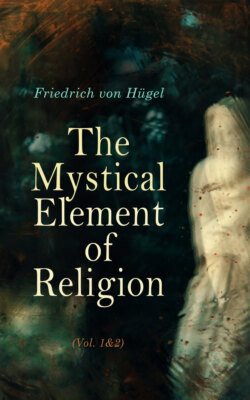Читать книгу The Mystical Element of Religion (Vol. 1&2) - Friedrich von Hügel - Страница 136
На сайте Литреса книга снята с продажи.
3. Giuliano’s Will.
ОглавлениеGiuliano had, by his Will of the 20th October 1494, ordered his body to be buried in the Hospital Church; and this was now carried out by Catherine. A vault of some dimensions must have been made or bought, since later both she herself and Argentina del Sale declared their wish to be buried in Giuliano’s “monument.” Perhaps the wish of the latter was carried out.
But Giuliano had left two far more important and difficult matters to the management of Catherine,—matters which, indeed, were respectively full of pain and of anxiety for her,—Thobia, and his share in the Island of Scios. As to Thobia, he had left £500 to the Protectors of the Hospital, among which were reckoned £200 which he had already paid them through his late mother, Thobia Adorna, for the keep of this daughter of his, and had warmly recommended her to their kind care; and had arranged, in case they refused this responsibility, that Thobia (who must by now have been quite twenty-six years of age) should be regularly paid the interest on this money. He also left to Catherine, for payment to “a certain person in Religion,”—possibly a member of a Third Order, and whose identity is carefully concealed, but who cannot fail to be Thobia’s mother—“£150, in repayment of the same sum, borrowed from her by himself and the said Catherine,”—money which this poor mother will have spent on the child’s keep, up to the time when Giuliano told his story to Catherine.
As to his two carati (shares) in the lands of the Island of Scios, farmed by the Genoese Merchant Company “Maona,” he desires that, if sold, his cousins Agostino and Giovanni Adorno shall be able to buy these carati for a lower price than would be required of any other purchaser. There are also elaborate conditions and alternatives attached to a legacy of £2,000 to his unmarried nephew Giovanni Adorno, with a view to his marrying and having legitimate children: an anxiety which of itself would show how sincere had been Giuliano’s own conversion, and which was evidently not far-fetched, since in this very Will he leaves £125 to a natural sister of his, Catherine, daughter of his father Jacobo, for the boarding (no doubt during the latter years of her life) of his late mother, Thobia Adorna.
Giuliano had also left Catherine herself £1,000,—a return of her marriage dowry, and £100 from himself; and in addition “all garments, trinkets, gold, silver, cash, furniture, and articles of vertu, which might be found either in his dwelling-place or elsewhere.” And he does so because he “knows and recognizes that the said Catherine, his beloved wife and heiress, has ever behaved herself well and laudably towards himself,” and “wants to provide the means for her continuing to lead, after his death, her quiet, peaceful, and spiritual mode of life.” And he adds the condition that, “if the said Catherine were to proceed to a second marriage (a thing which he does not think she will ever do), then he deprives her of all the legacies and rights and duties of heirship mentioned in this Will, and confers them upon the honourable Office of the Misericordia of Genoa,”—a society with and for which, as we have seen, Catherine had worked so much and so well.
Altogether Giuliano had left by this Will about £6,000 for Catherine to allot and appropriate; and quite £4,000 of this sum-total demanded careful and even anxious consideration, whilst £650 of it could not but provoke painful memories and make a call upon all her generosity. And by his Codicil of January 1497, he had given her still greater latitude of action, by declaring that, as regarded his legacy to the Hospital, Catherine should have full power and leave to abrogate or to modify it, according to her will and pleasure.[127] Thus these documents constitute an impressive proof of Giuliano’s full trust in the wisdom, balance of mind and magnanimity of his wife, now herself already so broken in health.
